After my article was posted in a local paper, a few locals contacted me with congratulations, mending requests, and memories of formal
dresses past. One of these lovely people
actually owned a Ceil Chapman original, and generously offered to let me see
it, in person. Yes, please!
Well, yesterday was the day.
And here she is. Yummy silk? Check.
Stunning draping? Check. The perfect 1950s cocktail dress? Check.
It must be a Ceil Chapman. And
here is the proof.
The pictures are not the best, but they will remind me of my
brush with greatness. And I thought some
of you might appreciate a look inside a vintage gown. No museum exhibit has ever let me handle and
examine one of their pieces and here was a once in a lifetime opportunity
(well, to be honest, I hope there will be more opportunities and dresses to ogle).
The current owner was not the first, and since she never
made any changes to the garment, it is hard to be sure what is original, and what may have
been altered. She only had a few opportunities to wear the
dress, but her daughter wore it on her sweet sixteen, so it has a lovely
history and will hopefully be passed on to the next generation. She even allowed her daughter’s
friends to try the dress on for a few glamorous minutes. I only hope they appreciated the
gesture. Do you think they remember the
day they wore a Ceil Chapman original? I
sure hope so!
The dress was obviously altered at the center back to fit an
exceptionally teeny tiny waist. And the
dress was extremely small to begin with!
The bodice is underlined with a purple acetate.
And the skirt is underlined with a stiff interfacing. Surprisingly enough, this is the one part of
the dress that has not aged well. The
interfacing looks discolored and feels a bit brittle.
To help make the upper hip area stand away from the body, some stiff gathered fabric (I think it is some kind of treated cotton) is
attached. It looks like a little hidden peplum. I will have to remember this trick!
The skirt has quite a bit of body, and I imagine that it
would need very little in the way of a crinoline or petticoat to help the gown
hold its shape.
The gown has a metal zipper with a centered application.
Boning covers the bodice darts. They are attached to the acetate
underlining. If you push aside the pinked strip
of fabric that covers them, you can see that the bones themselves are
covered in the interfacing used on the skirt pieces. I was surprised to see that the bodice is not more
structured.
The beautiful cross drape on the front of the bust continues
around to the back and hooks to thread eyes at the center back.
I was very interested to see that the waist stay is made of
self-fabric. I have never seen anything
like it!
And look, the hem is finished with rayon seam binding! The back edges along the zipper are as well. I would assume that the binding originally was
sewn down the length of the back edges, but when the waist was taken in, the
sewer continued the alterations down to the hem.
Isn’t she beautiful?
And in remarkable shape for someone who must be over 50 years old!

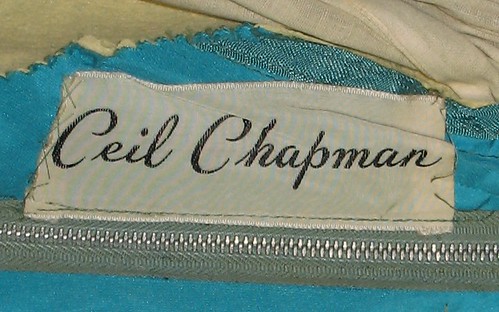
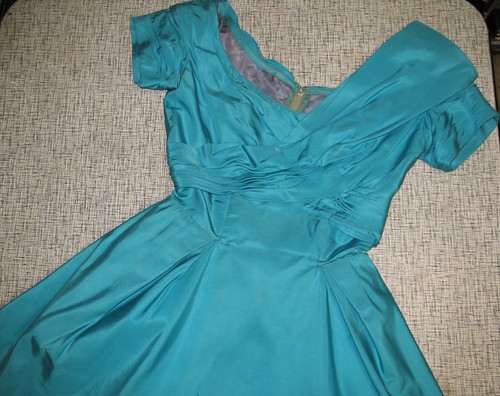
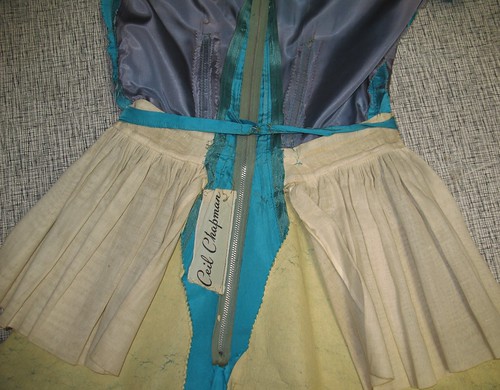
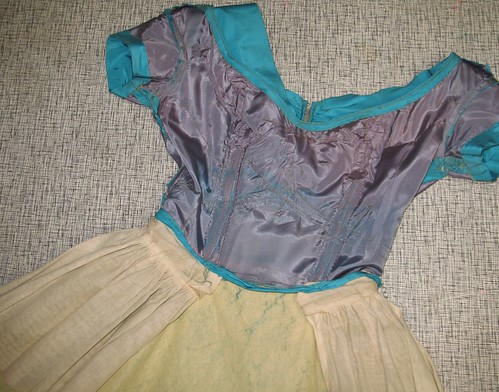
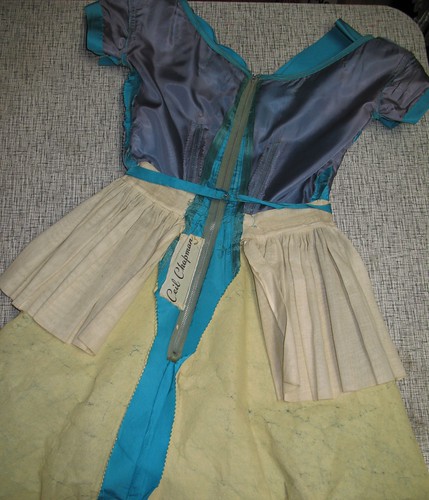
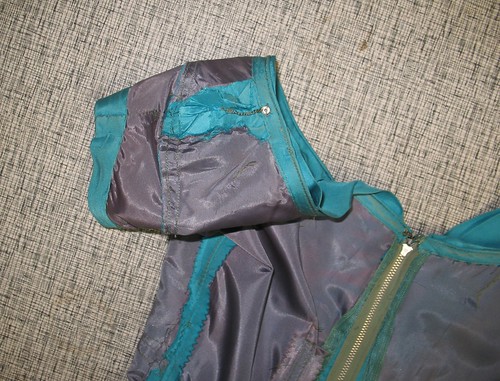

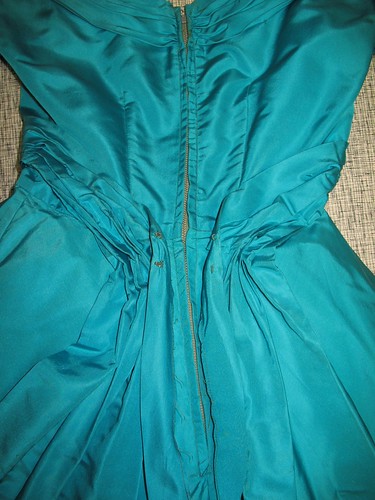
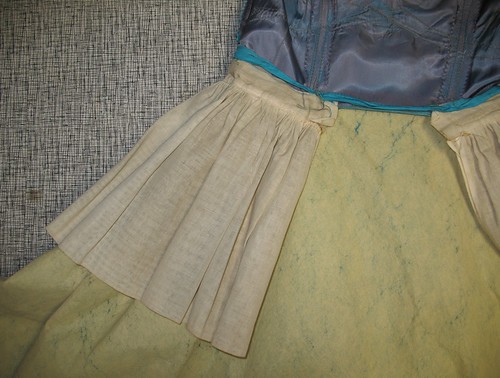
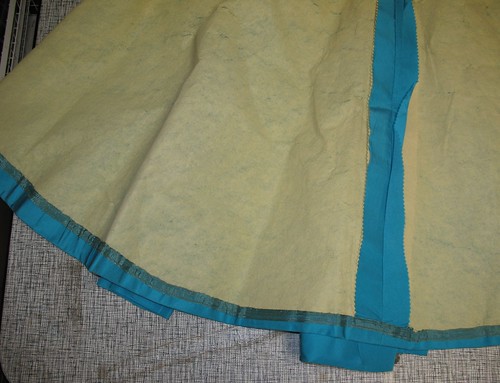
I always wondered how those kinda dresses held their shape. Interfacing and stiff material at the hips. That's fascinating. I thought it was all done with petticoats.
ReplyDeleteJust lovely, thanks for the tour!l
ReplyDeletewhat a treat! I'm continually amazed just how much work and precision wentinto pieces like these.
ReplyDeleteIt would be lovely to see it on the owner or a dress form. Thanks for sharing this with us. What a lovely dress.
ReplyDeleteI asked about photos, but she does not remember any being taken of her in the dress. Too bad, right?
DeleteAnd I wish I had a picture taken on a form, or a body, but it might be difficult to find one small enough! But it sure was fun having a look inside!
What a neat opportunity!!! :D Thank you ever so much for taking all these pictures and sharing your observations with us. :)
ReplyDeleteA lovely piece of sewing and fashion history. Thanks for sharing!
ReplyDeleteThank you so much, the analysis of the details is exactly what we all wish for when we see a genuine article like this. So many wonderful surprises and excellent construction tips.
ReplyDeleteI hope you get more opportunities like this!
Thanks so much for sharing with us Laura! It is beautiful, and must look wonderful on!
ReplyDeleteHow exciting for you! What a treat, thanks for sharing it with all of blogdom.
ReplyDeleteI can't get over that people contacted you with mending requests! After making that incredible dress. I am gobsmacked.
Ooooh, lovely! How did you keep from drooling on it?
ReplyDeleteIt was tough, Clio!
DeleteThis comment has been removed by the author.
ReplyDeleteThat trick with the pleated material at the waist is really quite clever, and I can especially see the advantage for people in hotter climates like where I'm from, and during the summer in the dresses original home - you get a bit of the shape that's given to the skirt by crinolines without the layers and layers of fabric.
ReplyDeleteGertie wrote a really interesting post a while ago on hip padding in the New Look jackets (http://www.blogforbettersewing.com/2010/08/when-women-padded-their-hips.html) - could the shaping be related to that 'look' that was being aimed for?
What a beautiful dress! Thank you for sharing the pictures and construction details.
ReplyDeleteCongratulations! I loved the newspaper article. I've been reading your blog but didn't know those details about you. I used to sew all my own clothes, not too modern but with classic lines so I could relate to a lot!
ReplyDeleteThank you so much for sharing this gorgeous dress! Love that color! Thank you too for detailing the fascinating means for helping the skirt to stand out. I tried making a 1960's dress a few years ago but just couldn't get the skirts to poof out as much as I wanted. Great tips! I'm bookmarking this!
Laurie